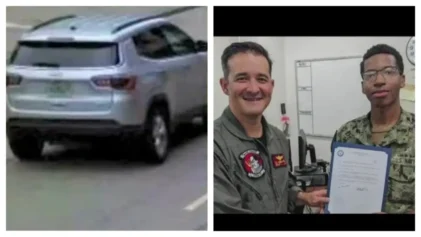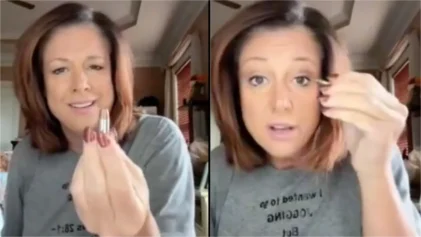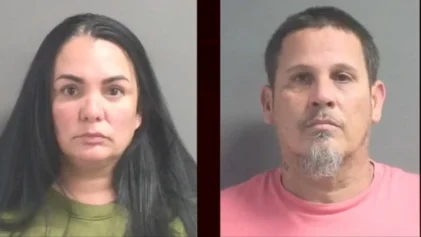A Tennessee school resource officer has stepped down following a viral arrest that sparked outrage among students and in the community.
Reports show the Hamilton County Sheriff’s approved Tim McCrae’s attorney’s request to have him removed as a school resource officer at East Ridge High School in East Ridge, Tennessee, near Chattanooga, after a video circulated of him grabbing a student by his locs and dragging him down a stretch of bleachers.
Students at the school walked out in protest of the student Tauris Sledge’s arrest. Some say the officer should not have been involved in the incident. Others said the student, identified as 18 by his father, should have been more respectful.
McCrae asked to be sent back to patrol, “which I think is a very telling thing, a police officer would rather go back on the street than work in one of our high schools,” McCrae’s attorney W. Gerald Tidwell said.
Jada Pettaway, one of the students who led the protest, said the arrest was the last straw for the students who wanted their voices to be heard. The students gathered on the football field shouting, “No justice. No peace” and “I’m not resisting.”
“It was like our last straw, which is what led us to, you know, the protests, the walkout and all of the topics that we addressed there,” she said.
A 15-second video of the Sept. 20 incident went viral on social media. Hamilton County Sheriff’s Department released a one-hour-and-7-second video two days later showing what happened before and after the boy was dragged.
In the video, a physical education coach tells the officer that a student refused to participate in a kickball game and said he was not feeling well but started playing basketball. The coach said Sledge threatened him before the officer arrived.
“So I come to him and said to hold up, you said you was sick, and he said, ‘Don’t approach me like that,’” the coach tells the officer. “I said, ‘I’m a teacher. I can talk to you how I want to.’”
The coach said he tried to walk the student outside to “give him a one-on-one.”
“He sorts of bucks me and come at me into my face,” the coach says. “And he won’t talk to me, and he says you’re racist mother f—-r. I’ll kick your f–king ass.”
The coach tells McCrae that he wants to speak to the boy with him because he needs to know that his behavior is wrong. Sledge tells a school official in the video that the coach approached him “aggressively,” and he told him “that’s not how you talk to me.” Sledge said he was sent to the class by his counselor because they needed to replace the teacher for a program he is in at the school.
“You could be a good citizen but be aware when you talking to me it’s respect,” Sledge said.
The coach interjects, and the two start to argue until the student stops talking. The coach explains his side. “I asked you a question. I didn’t come at you.”
The coach denies being racist. Things are relatively calm until Sledge gets upset and starts to yell. Two school officials and the officer tell Sledge to calm down. At one point, the officer touches the student’s shoulder telling him to relax.
“You got five seconds to get your hands off me,” Sledge says.
“What the f—k is you gon’ do,” McCrae replies.
The student then repeats his five-second warning a few times and says: “You better get your hands off of me and act like you got some sense.”
The officer tells the boy that he is causing a scene and that he could arrest him for disorderly conduct. Sledge walks away, and McCrae follows him to the bleachers.
“Get your stuff and let’s go,” McCrae says. The student refuses.
“I don’t give a f–k what you say,” Sledge says. “Get the f–k out of my face.”
“You finna talk a ride to jail, dude,” McCrae says. “I ain’t f—ing with you.”
Sledge says he hasn’t done anything wrong and continues to ignore the officer, who tells him again that his behavior is considered disorderly conduct. McCrae asks the student to get up and come with him six times before he grabs him and pulls him across the bleachers.
Once he is off the bleachers, the officer tells Sledge to remove his backpack so that he can put on the handcuffs. The two have a standoff for over a minute before the officer releases the front of the student’s backpack, giving him a chance to remove it on his own. The school official can also be heard urging the student to remove the bag.
Sledge instead calls a man on speakerphone and tells him his version of the events. The man says he’s on his way to the school. His father arrived at the school about 15 minutes later.
“Nothing finna happen until my lawyer gets here,” Sledge says.
The officer repeats the command several more times before pepper spraying the student. Still, Sledge kept his backpack on, and the officer pried it off his shoulder.
“And you’re still going to refuse. That’s fine because I have a whole can,” McCrae says, referring to the pepper spray.
“Mr. Sledge had lied on his hands on his stomach so that Mr. McCrae couldn’t get his hands out and cuff him,” McRae’s attorney told reporters. “That’s a learned behavior that is not a technique that comes natural to people.”
Sledge’s father said he was shocked when he got the call about the incident. The student’s attorney has raised questions about whether the arrest was legal.
“The question is going to be the arrest for a misdemeanor. And did that misdemeanor occur in the officer’s presence? If it did not occur in the officer’s presence? He’s got a problem,” Robin Flores said. “Because the Tennessee statute prohibits an arrest for a misdemeanor, outside of the presence of the officer.”
Kendra Young, director of Unified, a grassroots organization of educators and parents, said the resource officer should only be called for emergencies and not for disciplinary action. Their role is to protect and connect with students, she said.
“I think the district and the school board needs to look very long and hard at which officers are being placed in schools,” said Young, a former teacher.
Former policeman Napoleon “Donut” Williams said both the student and officer escalated things, but he agrees that McCrae shouldn’t have been called.
“See, he’s 18 years old and talking to an officer like that. You know. That’s wrong. This boy needs to respect the officer, and the officer needs to respect him. It’s a two-way street. Just as simple as that,” Williams said.
Williams added if the student didn’t feel well, then he should’ve been allowed to stay out, or his parents should’ve been contacted so he could go home.
The school district released a lengthy statement on Friday, following the protests pledging to review safety officer policies and procedures.
“We are providing clear and firm guidance to schools and law enforcement regarding our shared beliefs, commitments, shared protocols for engagement, and a continuous improvement process to foster student-centered relationships that support the safety and well-being of all HCS children,” the statement says.


